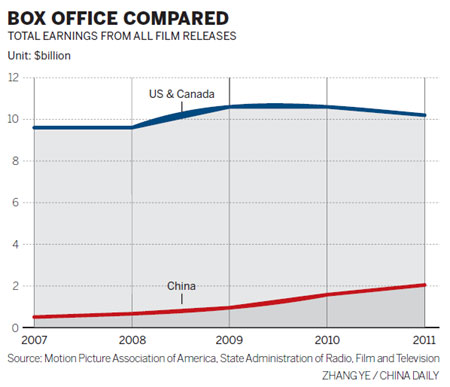 |
|
|
|
|||||||||
|
 |
China's booming movie industry is attracting interest from Hollywood heavyweights, as they chase bigger box-office returns to offset tighter margins at home.
Films with Asian and especially Chinese themes are becoming more prominent after Hollywood hit a 16-year low in movie ticket sales last year, while some of its biggest studios are setting up shop in the country.
DreamWorks Animation is setting up a China base while Legendary, the studio behind Christopher Nolan's "Batman" series, as well as Clash of the Titans and The Hangover franchises, is also developing a venture. And Keanu Reeves is making his directorial debut with Man of Tai Chi, which is filming in China.
"It's a hugely interesting time now," said executive producer Tracey Trench, whose projects have included Just Married and Ever After.
"The United States is still the biggest market. Within the next 10 years, we are not going to be the biggest market place. Everything is going to change," she told a forum at the Hong Kong International Film and Television Market in March.
China's rapidly expanding film industry continues to break new ground and set records, collecting an estimated 13.1 billion yuan ($2.07 billion) in 2011 - up about 30 percent year-on-year.
About 2,500 more cinema screens are expected to be opened across the country this year, with the market now the third-largest behind Japan and the United States.
This compares with a clear slowdown in North America.
The Motion Picture Association says box office takings from 2007 to 2011 in the US and Canada grew only 6.3 percent to $10.2 billion, while the Asia-Pacific region saw 38-percent growth to $9 billion.
Zhang Yimou's The Flowers of War was China's biggest box office smash of the past 12 months, starring Oscar-winning American actor Christian Bale.
It took in about $90 million from the Chinese box office and drew a nomination for best foreign language film at the Golden Globes in the US.
It comes as Hollywood looks to increasingly give a Chinese angle to its output.
"There are so many stories that you can tell, and right now China is hot, so many people want to know more," said screenwriter Glenn Berger, who wrote the popular 2008 animated Hollywood comedy Kung Fu Panda and its 2011 sequel.
A box-office hit in China, the film told the story of Po, an oversize and unfit panda who dreams of becoming a martial arts hero. But Berger said the movie was never really about China or kung fu.
"We were just trying to tell a classic underdog story, not particularly a Chinese story," he said of the film. "But it was very well received in the Chinese market because they thought it was very respectful of Chinese culture."
Kung Fu Panda raked in an estimated $630 million, with $26 million from the Chinese mainland alone.
Hong Kong's Filmart exhibition is Asia's major entertainment industry market and one of the top three events of its kind in the world.
This year it attracted a record 648 exhibitors and more than 5,700 buyers, up 14 percent from last year. The US pavilion had more than 40 US exhibitors.
Industry veterans said Chinese audiences are particularly drawn to movies that include Chinese references or elements of Chinese culture.
"People want to feel connected," said Chinese-American writer Rita Hsiao, who wrote the screenplay for Toy Story 2 and 1998 animated musical Mulan, a story about a legendary Chinese girl-warrior.
"If you have that universal message and it's interesting, everybody everywhere can connect with it," she said.
One of the main obstacles for foreign filmmakers wanting to crack the Chinese market is a regulation limiting the number of international films that can be screened in the country to just 20 a year.
It forces studios to co-produce films with Chinese partners or risk having their films blocked at the border.
But all the pandas in the world won't guarantee a hit in China.
"It has to succeed on all the fundamentals of a movie, not just because it is shot in China," Berger said.
Agence France-Presse